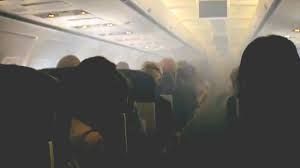A bipartisan group of senators and representatives has introduced the Cabin Air Safety Act in both houses to tighten regulations surrounding so-called fume incidents in which cabin bleed air is contaminated by toxic chemicals from the airplane itself or from external sources. “Pilots, flight attendants and passengers should never have to worry about toxic fumes filling an aircraft cabin mid-flight,” said Sen. Diane Feinstein, D-Calif. “Unfortunately, this happens hundreds of times a year and in some cases requires passengers to seek medical attention.” The Senate bill was sponsored by Sen. Richard Blumenthal, D-Conn., and the House bill was put forth by Rep. John Garamendi, D-Calif.
The bill acknowledges that most flights proceed with clean cabin air but occasionally engine or hydraulic oil can leak into the system, as can de-icing fluid. The resulting fumes can cause immediate symptoms and there is concern over longer term effects. While no airline wants toxic air in the cabin, the bill aims to tighten up reporting requirements and mandate installation of monitoring equipment and detectors to alert crew to contamination. It would also make investigations into reports of fume events mandatory.




































No farting or breathing on planes… period.
BO is bad too… plastic suits need to be required with full face masks.
Only safe way to keep flying.
So hepa filters don’t help situations like this?
My flight instructor got mad at me once. For flying with him the day after a party. He said that I was going to pay for this lesson dearly after what I put him through. Guess he needed that bio suit.)
How often does this really happen? And what levels of what chemical are “toxic”? And how are these toxic effects manifest in people who inhale them? Over what period of time? Long term, short term? Finally, when I’ve flown commercially, I seem to remember smelling jet exhaust when on the ramp but once underway, the cabin seems to have been odorless.
If this was happening “hundreds of times a year” as Senator Feinstein says, the FAA would be on the manufacturer’s behinds investigating this. Just another worthless attempt at regulation by legislation by Senators and Representatives who have nothing better to do!
avherald is reporting 6 smoke or cabin/cargo fire warnings since March 23. I read a herald daily and see numerous reports of smoke/fire warnings.
I know a retired airline captain who had it happen on one of his flights. He had to divert to another airport and send passengers and crew to get medical attention. He told me that all of the Boeing aircraft except the Dreamliner are susceptible to it because they use engine driven air compressors while the Dreamliner uses an electric compressor. None of the Airbus aircraft have this problem according to him.
avherald report:
incident: Lufthansa A343 over Atlantic on Mar 27th 2022, smoke on board
By Simon Hradecky, created Monday, Mar 28th 2022 14:37Z, last updated Monday, Mar 28th 2022 14:37Z
A Lufthansa A340-300, registration D-AIGN performing flight LH-438 from Frankfurt/Main (Germany) to Dallas Ft. Worth,TX (USA), was enroute at FL330 about 350nm southsouthwest of Keflavik (Iceland) when the crew decided to divert to Keflavik due to smoke on board. The aircraft descended to FL300 initially and landed safely on Keflavik’s runway 01 about 80 minutes later.
The occurrence aircraft remained on the ground in Keflavik for about 24 hours, then positioned back to Frankfurt.
Our “D” politicians hard at work fixing everything but what SHOULD be fixed.
I guess you missed the “bipartisan” in the article. I’m not sure how since it was only the second word in the first sentence.
Anyway, the press release for the ACT goes further, listing the Rs that made it bipartisan: “…the bill is co-sponsored by Representatives Brian K. Fitzpatrick (R-Pa.), Kaiali’I Kahele (D-Hawaii) and Don Bacon (R-Neb.).”